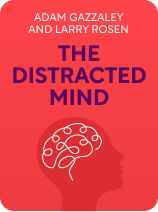
This article is an excerpt from the Shortform book guide to "The Distracted Mind" by Adam Gazzaley and Larry Rosen. Shortform has the world's best summaries and analyses of books you should be reading.
Like this article? Sign up for a free trial here.
Why do we get distracted so easily? What are the limitations of cognitive control?
In The Distracted Mind, Adam Gazzaley and Larry D. Rosen define the distracted mind as an ingrained vulnerability to distractions and interruptions. They then discuss how this vulnerability arose because our higher-level goals outstripped our cognitive control.
Here’s why the brain can become an easy victim to distractions.
Defining the Distracted Mind
To understand Gazzaley and Rosen’s later arguments about the distracted mind, it’ll help to understand what the distracted mind is to begin with. Put simply, they define the distracted mind as our susceptibility to interference that hinders our ability to achieve our goals. But why do we get distracted so easily?
At a broad level, Gazzaley and Rosen consider interference to be anything that disrupts your attempt to fulfill a specific goal. For example, imagine that you want to make your morning coffee, so you decide to grind some coffee beans. If, during this process, you receive an email notification that you stop to read, that would be a form of interference.
(Shortform note: Gazzaley and Rosen use “goal” in a broad sense; they aren’t just concerned with specific ambitions, like becoming a doctor or finishing a marathon, but rather with any task that we set out to accomplish, no matter how mundane. Thus, interference can be a problem in all areas of life, from simple tasks like brushing your teeth and making breakfast to complicated tasks like graduating from college.)
More narrowly, they assert that interference can come in the form of distractions or interruptions. On the one hand, distractions refer to irrelevant stimuli or information that catch our attention unintentionally. For instance, if you’re driving to work in the morning but have your attention temporarily diverted by a flashy car and miss your exit, that constitutes a distraction. (Shortform note: Though distractions afflict everyone to an extent, those with attention deficit hyperactivity disorder (ADHD) are especially susceptible to distractions. Indeed, those with inattentive ADHD—a subclass of ADHD—struggle to sustain focus, making distractions far more difficult to resist.)
On the other hand, interruptions are intentional decisions to pursue a secondary goal that detracts from your primary goal. Returning to the previous example, if you consciously decided to stop and grab donuts on your way to work, that would count as an interruption rather than a distraction. (Shortform note: Procrastination is one common form of interruption, in which you deliberately seek out distractions to avoid working on required tasks. According to experts, this particular mode of interruption often stems from perfectionism since perfectionists worry that they won’t meet their high internal standards, leading them to put off work as long as possible.)
How Cognitive Control Limitations Make Us Susceptible to Interference
Having seen what it means to be vulnerable to interference, we can now discuss the origins of this weakness. Gazzaley and Rosen argue that we’re susceptible to interference because our cognitive control—the group of faculties that allow us to fulfill our goals—has limitations that make us susceptible to interference. To show as much, they examine these three faculties (attention, working memory, and goal management) to highlight their shortcomings.
Faculty #1: Attention
According to Gazzaley and Rosen, the first component of cognitive control is attention. They write that attention is similar to a spotlight since it allows us to attend to particular stimuli in our environment. For example, attention can allow us to focus on the car in front of us in a traffic jam, the scent of pretzels in a mall, or the crying baby in a movie theater.
When it comes to meeting our goals, Gazzaley and Rosen argue that the ability to focus on particular stimuli increases our brain’s efficiency by filtering out irrelevant information. For instance, imagine that you’re a concert pianist performing a concerto. Instead of fixing your attention on all the other stimuli present, such as the whispers of the crowd or the lighting on stage, you selectively focus on the piano in front of you to maximize your performance.
However, our capacity for selective attention has limits. In particular, Gazzaley and Rosen note that our attention can be derailed by environmental stimuli that catch our attention, such as sudden movements or loud noises.
Faculty #2: Working Memory
Next, Gazzaley and Rosen discuss working memory, the faculty that allows us to retain key pieces of information in our mind over short time spans. They argue that working memory is crucial in executing higher-level goals because it allows us to decide how to act on the basis of past perceptions. For example, imagine that you’re driving to a new location after checking the directions at home; your working memory enables you to recall those directions and thus correctly decide which turns to make.
But, just like attention, our working memory is saddled with limitations that make us vulnerable to interference. Specifically, Gazzaley and Rosen cite experiments showing that working memory is limited in its accuracy (especially as time goes on) and its storage capacity—and interference can exacerbate these weaknesses.
Faculty #3: Goal Management
Finally, Gazzaley and Rosen turn to goal management, our capacity for dividing up tasks to accomplish multiple goals within a fixed timeframe. They write that, because humans evolved to juggle multiple goals concurrently, goal management is essential for deciding which tasks to prioritize.
Goal management, they note, is a combination of two abilities: multitasking and task-switching. Multitasking refers to an attempt to perform multiple tasks simultaneously.
However, our capacity for goal management also has shortcomings. With respect to multitasking, Gazzaley and Rosen note that our brain can’t process two streams of information at once, meaning we can’t actually multitask—our attempts to do so are actually just a form of rapid task-switching. With respect to task-switching, the authors point out that experiments have shown we suffer performance decreases when we switch between two tasks, as we become less efficient performing the second task. For these reasons, our secondary goals can become a form of interference that harms our ability to fulfill our primary goals.

———End of Preview———
Like what you just read? Read the rest of the world's best book summary and analysis of Adam Gazzaley and Larry Rosen's "The Distracted Mind" at Shortform.
Here's what you'll find in our full The Distracted Mind summary:
- How technology has made us more prone to distractions and interruptions
- How to modify your environment to reduce distractions and boredom
- How to minimize your susceptibility to interference and improve cognitive control






